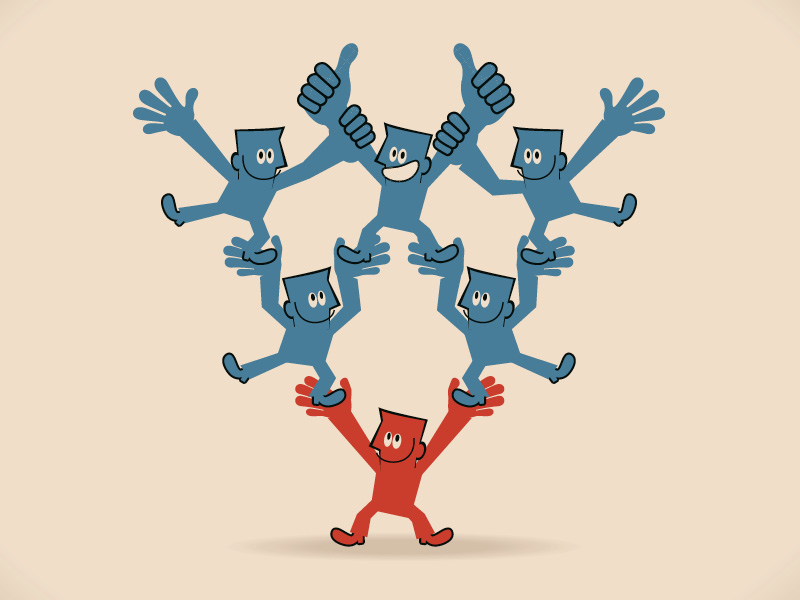You know that feeling: It’s Sunday night, you’ve had a great weekend and then you remember tomorrow’s Monday — and work! It’s not that you don’t like your job or what you do, but it’s work and you could do without it.
Employee Engagement is Key
We know that employee engagement is a key factor in the success of any business, large or small. We want our employees to enjoy coming to work and to find reward and meaning in it.
According to Gallup, businesses with highly engaged employees show an EPS (earnings per share) return of 147% over those with unengaged employees.
Sadly, and also according to Gallup, only around 33% of the population are in the engaged category, so we have some work to do.
My definition of engagement is that employees:
- Feel that THEY matter, and
- Feel that WHAT THEY DO matters.
Much of that hinges on our ability to form and build trusting relationships and to have open and honest conversations.
One of the proven factors in building deep and trusting relationships is the preparedness of an individual to reveal something intimate about themselves — to self-disclose. Patrick Lencioni, author of The Five Dysfunctions of a Team, would refer to this as ‘building vulnerability-based trust’ which he claims is the number one critical and foundational element to building functional teams.
There are many factors that feed into relationship building and engagement, some more difficult than others to achieve, but there is one easy way to provide a great foundation: humour! Research shows that when people laugh together they are more likely to trust and open up to one another. Too easy.
Lighten Up, Lola!
Dwight Eisenhower famously said: “A sense of humour is part of the art of leadership, of getting along with people, of getting things done.”
Sydney-based dynamo Robi Mack is a former Clown Doctor, an expert on emotional intelligence and humour, and a good friend of mine. She says that: “Humour connects and engages people on a heart level that spurs creativity, collaboration and helps build relationships. Humour relieves tension, gives you a way of coping and performing when under pressure. When there’s tension in the room, humour helps to break it and your employees relax, think more clearly, and make better decisions. You can’t smile without your body feeling better.”
But is laughter and humour in the workplace just a ‘nice to have’? Not any more. In the last few decades there has been a substantial body of research to support the positive value of the ability to have a chuckle on a number of aspects of the human condition.
You can’t argue with the facts
Humour is a key ingredient in creative and insightful thinking for a number of reasons. People are more inspired and focused when they are relaxed, but we now also know, thanks to the research of US-based Professor Mark Beeman, that one of the four key contributors to insight in the brain (the ‘Aha!’ moment) is the state of being ‘slightly happy’.
The ROI on laughter is broad. It:
- helps build trust
- boosts morale
- can increase productivity
- puts others at ease
- is humanising, and
- is great for diffusing high negative emotion and stress.
Some quick tips…
So I’m not suggesting that you should take a stand-up comedy course, or spend Sunday evening searching for the latest side-splitting jokes. There are much easier ways to lighten-up and humanise your team environment.
Firstly, we have self-deprecation: your ability to laugh at yourself. This is not always easy, but is best to put in play when you have stuffed up in front of the team. Not only does this humanise you in front of your team and therefore make you more appealing and approachable, but it gives permission to the team to be OK with taking calculated risks and dealing effectively with the inevitable occasional fallout — an essential ingredient in building a learning and growth-focused team.
Secondly, we have situational acceptance humour: your ability to turn a situation that could be perceived as catastrophic and see the funny side of it.
And finally, and most importantly, your ability to help individual members of the team to see the funny side of their failure — to even go as far as to celebrate them. Perhaps a weekly bottle of champagne to celebrate the team’s most ‘epic fail’.
At the end of the day, catastrophising, regretting risks taken, and punishing mishaps gets you nowhere, and your ability to bring a little ‘lightness’ into the seriousness of the work you do will support you team to embrace future challenges and to give of their best.







